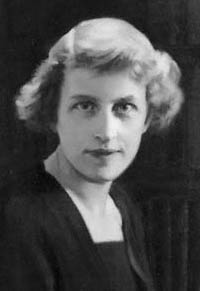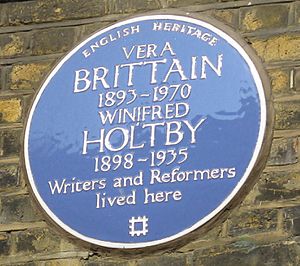Winifred Holtby facts for kids
Quick facts for kids
Winifred Holtby
|
|
|---|---|
 |
|
| Born | 23 June 1898 Rudston, East Riding of Yorkshire, England |
| Died | 29 September 1935 (aged 37) London, England |
| Occupation | Journalist, novelist |
| Language | English |
| Nationality | British |
| Education | Somerville College, University of Oxford |
| Notable works | South Riding (1936) |
Winifred Holtby (born June 23, 1898 – died September 29, 1935) was an English writer and journalist. She is best known for her novel South Riding. This book was published after she died in 1936.
Contents
Her Life Story
Winifred Holtby grew up in a well-off farming family. She was born in the village of Rudston, in East Riding of Yorkshire, England. Her mother, Alice, was important in local government. She was the first woman to be an alderwoman on the East Riding County Council.
Winifred was taught at home by a governess. Later, she went to Queen Margaret's School in Scarborough. In 1917, she passed the entrance exam for Somerville College, Oxford. But she decided to join the Women's Army Auxiliary Corps (WAAC) in early 1918. Soon after she arrived in France, the First World War ended. She then returned home.
In 1919, Winifred went to study at the University of Oxford. There, she met Vera Brittain, who was also a student. Vera later wrote the famous book Testament of Youth. Winifred and Vera became lifelong friends. Other writers they knew at Oxford included Hilda Reid, Margaret Kennedy, and Sylvia Thompson. After finishing their studies in 1921, Winifred and Vera moved to London. They hoped to become successful writers.
Her Beliefs and Friendships
Winifred Holtby was a strong supporter of several ideas. She was a feminist, meaning she believed in equal rights for women. She was also a socialist, which means she supported fairness in society and economy. And she was a pacifist, meaning she believed in peaceful ways to solve problems, not war.
She gave many talks for the League of Nations Union. This group worked for world peace. She was also part of the Six Point Group, which was a feminist organization. She was active in the Independent Labour Party, a political group. She also strongly supported black workers in South Africa getting fair treatment.
In 1926, Winifred wrote about why she was a feminist. She said she wished she didn't have to be one. She wanted to focus on her writing. But she felt that as long as women faced unfairness, she had to fight for their rights.
After Vera Brittain married George Catlin in 1925, Winifred often lived with them. She became like an aunt to Vera's children, John and Shirley. Shirley Williams, Vera's daughter, described Winifred as tall and full of life.
Facing Illness
In 1931, Winifred was diagnosed with Bright's disease. This was a serious kidney illness. Her doctor told her she only had about two years to live. Knowing her time was short, Winifred put all her energy into writing her most important book, South Riding.
Winifred Holtby died on September 29, 1935, when she was 37 years old. She never married. She is buried in the churchyard of All Saints' church in Rudston, near where she was born. Her tombstone says: "God give me work till my life shall end and life till my work is done."
Her Writings
Winifred Holtby wrote many books and articles. Her early novels were Anderby Wold (1923), The Crowded Street (1924), and The Land of Green Ginger (1927). These books had some success.
Winifred was also very well known for her journalism. She wrote for over 20 newspapers and magazines. These included the feminist magazine Time and Tide and The Manchester Guardian newspaper. She also wrote a weekly column for The Schoolmistress magazine.
During this time, she wrote more novels like Poor Caroline (1931) and Mandoa! Mandoa! (1933). She also wrote a book about the writer Virginia Woolf (1932) and a collection of short stories called Truth is Not Sober (1934).
In total, Winifred wrote 14 books. This included six novels and two collections of short stories. She also wrote Women and a changing civilization (1934). This book looked at women's roles in society. She dedicated it to Ethel Smyth and Cicely Hamilton, who were strong supporters of women's right to vote. Winifred also wrote poetry, including poems about Vera Brittain's brother, Edward.
South Riding and Its Impact
Winifred Holtby is most remembered for her novel South Riding. Her friend Vera Brittain helped edit it. The book was published after Winifred's death in March 1936. Critics loved it, and it won the James Tait Black Memorial Prize in 1936. It has been in print ever since.
South Riding is known for having a strong woman as its main character. This shows Winifred's feminist beliefs. The book has been made into a film (1938) and several TV shows. These include a 1974 version by Stan Barstow and a 2011 three-part series by Andrew Davies. There have also been radio plays of the book.
Vera Brittain wrote about her friendship with Winifred in her book Testament of Friendship (1940). Many of Winifred's papers and letters are kept in libraries. You can find them at the Hull History Centre in Yorkshire, and other places like McMaster University in Canada.
Her Legacy
Winifred Holtby's work continues to be important. In 1967, the Royal Society of Literature created the Winifred Holtby Memorial Prize. This award was for the best regional novel of the year. In 2003, this prize became part of the Ondaatje Prize.
After her death, Winifred left some money and her books to a library in Soweto, South Africa. This library, named the Winifred Holtby Memorial Library, opened in December 1940. It was the first library built in Africa specifically for non-European people.
See also
 In Spanish: Winifred Holtby para niños
In Spanish: Winifred Holtby para niños
 | Roy Wilkins |
 | John Lewis |
 | Linda Carol Brown |


